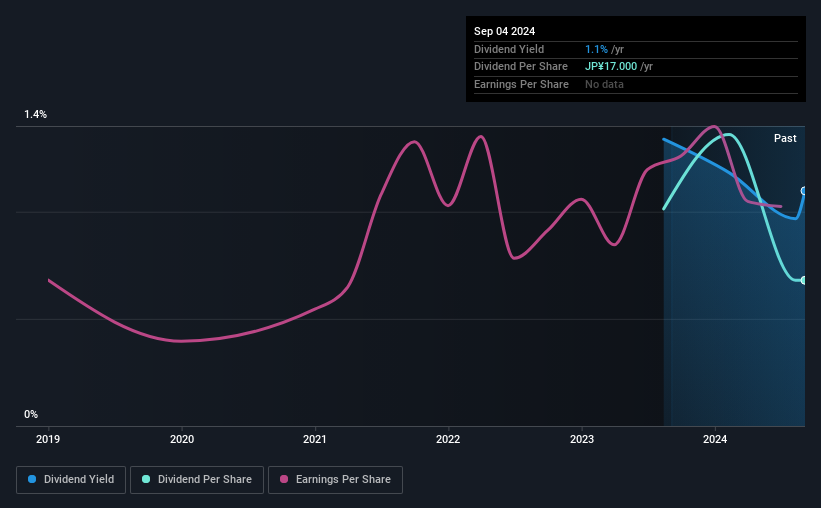J.E.T. Co., Ltd.'s (TSE:6228) dividend is being reduced from last year's payment covering the same period to ¥17.00 on the 28th of March. This means that the annual payment will be 1.1% of the current stock price, which is in line with the average for the industry.
While the dividend yield is important for income investors, it is also important to consider any large share price moves, as this will generally outweigh any gains from distributions. J.E.T's stock price has reduced by 44% in the last 3 months, which is not ideal for investors and can explain a sharp increase in the dividend yield.
Check out our latest analysis for J.E.T
J.E.T's Earnings Easily Cover The Distributions
We like a dividend to be consistent over the long term, so checking whether it is sustainable is important. Prior to this announcement, J.E.T's earnings easily covered the dividend, but free cash flows were negative. With the company not bringing in any cash, paying out to shareholders is bound to become difficult at some point.
If the trend of the last few years continues, EPS will grow by 20.2% over the next 12 months. If the dividend continues along recent trends, we estimate the payout ratio will be 14%, which is in the range that makes us comfortable with the sustainability of the dividend.

J.E.T Doesn't Have A Long Payment History
It's not possible for us to make a backward looking judgement just based on a short payment history. This doesn't mean that the company can't pay a good dividend, but just that we want to wait until it can prove itself.
The Dividend Looks Likely To Grow
Given that dividend payments have been shrinking like a glacier in a warming world, we need to check if there are some bright spots on the horizon. J.E.T has impressed us by growing EPS at 20% per year over the past five years. Earnings have been growing rapidly, and with a low payout ratio we think that the company could turn out to be a great dividend stock.
We should note that J.E.T has issued stock equal to 16% of shares outstanding. Trying to grow the dividend when issuing new shares reminds us of the ancient Greek tale of Sisyphus - perpetually pushing a boulder uphill. Companies that consistently issue new shares are often suboptimal from a dividend perspective.
In Summary
In summary, dividends being cut isn't ideal, however it can bring the payment into a more sustainable range. While J.E.T is earning enough to cover the payments, the cash flows are lacking. This company is not in the top tier of income providing stocks.
Companies possessing a stable dividend policy will likely enjoy greater investor interest than those suffering from a more inconsistent approach. However, there are other things to consider for investors when analysing stock performance. To that end, J.E.T has 3 warning signs (and 2 which are concerning) we think you should know about. If you are a dividend investor, you might also want to look at our curated list of high yield dividend stocks.
New: Manage All Your Stock Portfolios in One Place
We've created the ultimate portfolio companion for stock investors, and it's free.
• Connect an unlimited number of Portfolios and see your total in one currency
• Be alerted to new Warning Signs or Risks via email or mobile
• Track the Fair Value of your stocks
Have feedback on this article? Concerned about the content? Get in touch with us directly. Alternatively, email editorial-team (at) simplywallst.com.
This article by Simply Wall St is general in nature. We provide commentary based on historical data and analyst forecasts only using an unbiased methodology and our articles are not intended to be financial advice. It does not constitute a recommendation to buy or sell any stock, and does not take account of your objectives, or your financial situation. We aim to bring you long-term focused analysis driven by fundamental data. Note that our analysis may not factor in the latest price-sensitive company announcements or qualitative material. Simply Wall St has no position in any stocks mentioned.
About TSE:6228
J.E.T
Engages in the design, development, manufacture, sale, and after-sales maintenance service of semiconductor cleaning equipment in Japan, South Korea, China, Taiwan, and internationally.
Excellent balance sheet and good value.
Market Insights
Community Narratives




